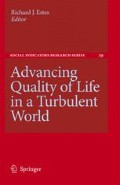Access this chapter
Tax calculation will be finalised at checkout
Purchases are for personal use only
Preview
Unable to display preview. Download preview PDF.
References
Achat, H., Kawachi, I., Levine, S., Berkey, C., and Coakley, E. (1998). Social networks, stress and health-related quality of life. Quality of Life Research, 7:735–750.
Ahearn, F.L. (1995). Displaced people. Encyclopedia of Social Work, 19th edition, Washington, DC: National Association of Social Workers, pp. 771–779.
Baptiste, D.A., Jr. (1993). Immigrant families, adolescents and acculturation: Insights for therapists. Marriage & Family Review, 19(3\4):341–363.
Ben-David, A. (1995). Family functioning and migration: Considerations for practice. Journal of Sociology & Social Welfare, 22(3):121–137.
Ben-David, A. and Lavee, Y. (1994). Migration and marital distress: The case of Soviet Immigrants. Journal of Divorce & Remarriage, 21(3\4):133–145.
Bhagat, R.S. (1999). Getting started and getting ahead: Career dynamics of immigrants. Human Resource Management Review, 9(3):349–368.
Burke, A.W. (1980). Family stress and the precipitation of psychiatric disorder. International Journal of Social Psychiatry, 26(1):35–41.
Caliguiri, P.M. (2000). Selecting expatriates for personality characteristics: A moderating effect of personality on the relationship between host national contract and cross cultural adjustment. Management International Review, 40(1):61–80.
Cheung, M. (1989). Elderly Chinese living in the United States: Assimilation or adjustment? Social Work, 34(5):457–461.
Congress, E.P. (1994). The use of culturagrams to assess and empower culturally diverse families. Families in Society: The Journal of Contemporary Human Services, 75(7): 531–540.
Dugsin, R. (2001). Conflict and healing in family experience of second-generation emigrants from India living in North America. Family Process, 40(2):233–242.
Hartman, M. and Hartman, H. (1986). International migration and household conflict. Journal of Comparative Family Studies, 17(1):131–138.
Helgeson, V.S. (2003). Social support and quality of life. Quality of Life Research, 12(suppl.1):25–31.
Herdman, M., Fox-Rushby, J., and Badia, X. (1998). A model of equivalence in the cultural adaptation of HRQoL instruments: The universalist approach. Quality of Life Research, 7:323–335.
Hernandez, M. and McGoldrick, M. (1999). Migration and the life cycle. In Carter, B. and McGoldrick, M. (eds.), Expanded Family Life Cycle: Individual, Family, and Social Perspectives, 3rd edition, Boston, MA: Allyn and Bacon.
Ho, M.K. (1987). Family Therapy with Ethnic Minorities. Newbury Park, CA: SAGE.
Hunt, S.M. (1997). The problem of quality of life. Quality of Life Research, 6:205–212.
Kibria, N. (1994). Household structure and family ideologies: The dynamics of immigrant economic adaptation among Vietnamese refugees. Social Problems, 41(1):81–96.
Kim, Y.Y. (1978). A communication approach to the acculturation process: A study of Korean immigrants in Chicago. International Journal of Intercultural Relations, 2(2):197–224.
Lee, B.K. and Chen, L. (2000). Cultural communication competence and psychological Adjustment. Communication Research, 27(6):764–793.
Leslie, L.A. (1993). Families fleeing war: The case of Central Americans. In Settles, B.H., Hanks, D.E., III, and Sussman, M.B. (eds.), Families on the Move: Migration, Immigration, Emigration, and Mobility, New York: The Haworth Press, pp. 193–205.
Matsuoka, J.K. (1990). Differential acculturation among Vietnamese refugees. Social Work, 35(4):341–345.
Padilla, A.M., Wagatsuma, Y., and Lindholm, K.J. (1984). Acculturation and personality predictors of stress in Japanese and Japanese-Americans. The Journal of Social Psychology, 125(3):295–305.
Raj, A. and Silverman, J.G. (2003). Immigrant south Asian women at greater risk for injury from intimate partner violence. American Journal of Public Health, 93(3):435–438.
Rettig, K.D. and Leichtentritt, R.D. (1999). A general theory for perceptual indicators of family life quality. Social Indicators Research, 47:307–342.
Saxena, S., Carlson, D., Billington, R., and Orley, J. (2001). The WHO quality of life assessment instrument (WHOQOL-Bref): The importance of its items for cross-cultural research. Quality of Life Research, 10:711–721.
Skevington, S.M. (2002). Advancing cross-cultural research on quality of life: Observations drawn from the WHOQOL development. Quality of Life Research, 11:135–144.
Smits, J., Mulder, C.H., and Hooimeijer, P. (2003). Emigration and immigration; couples; sex role. Urban Studies, 40(3):603–614.
Welham, J., Haire, M., Mercer, D., and Stedman, T. (2001). A gap approach to exploring quality of life in mental health. Quality of life Research, 10:421–429.
Wrosch, C. and Scheier, M.F. (2003). Personality and quality of life: The importance of optimism and goal adjustment. Quality of Life Research, 12(Suppl. 1):59–72.
Editor information
Editors and Affiliations
Rights and permissions
Copyright information
© 2007 Springer
About this chapter
Cite this chapter
Harr, C. (2007). Migrant Family Adaptation and Quality of Life: A Qualitative Study in Brazil. In: Estes, R.J. (eds) Advancing Quality of Life in a Turbulent World. Social Indicators Research Series, vol 29. Springer, Dordrecht. https://doi.org/10.1007/978-1-4020-5110-4_13
Download citation
DOI: https://doi.org/10.1007/978-1-4020-5110-4_13
Publisher Name: Springer, Dordrecht
Print ISBN: 978-1-4020-5099-2
Online ISBN: 978-1-4020-5110-4
eBook Packages: Humanities, Social Sciences and LawSocial Sciences (R0)

